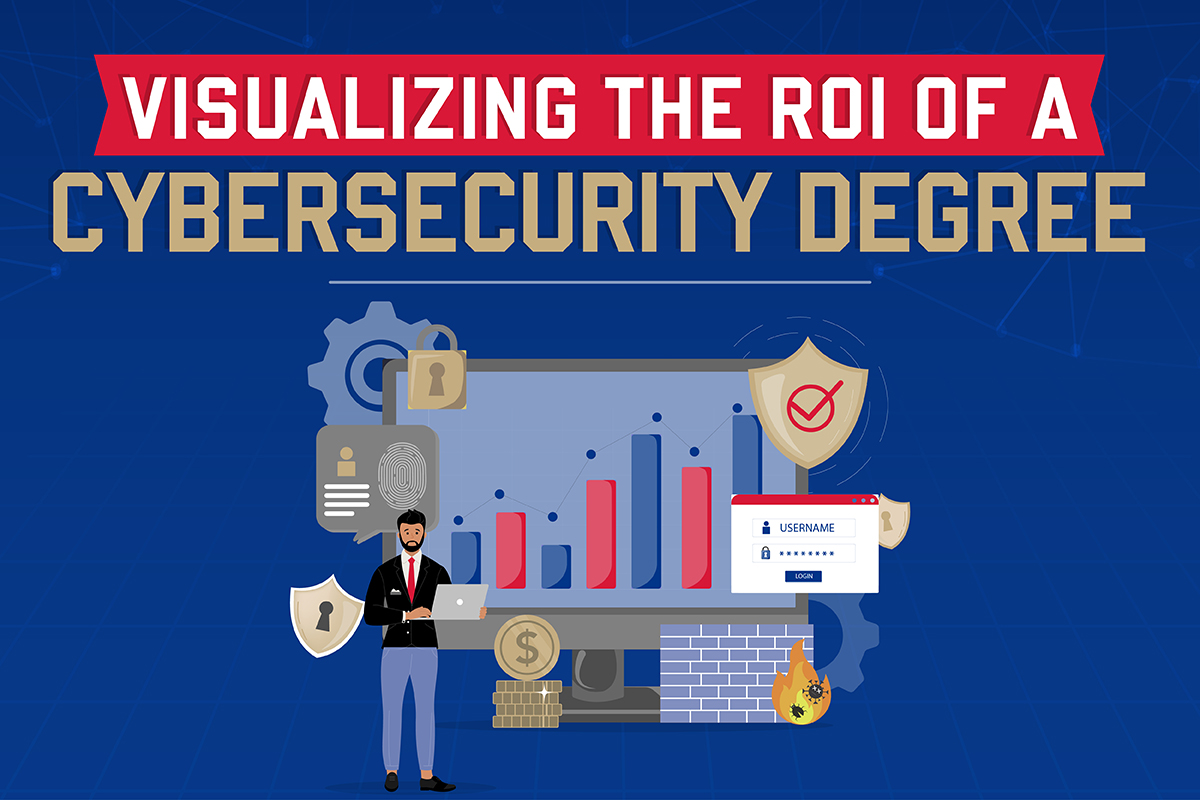Information Security vs. Cybersecurity: What’s the Difference?
Written by:
University of Tulsa
• Dec 13, 2023

In 2022, phishing attacks grew by 48%, ransomware attacks shot up 41%, and health care data breaches cost an estimated $10 million per incident. It’s no surprise why companies around the world spent over $71 billion on IT security.
In today’s digital world, information security is more important than ever. Professionals with an education in cybersecurity are in high demand. But what’s the difference between information security and cybersecurity? And how do professionals launch careers in cybersecurity?
What is Information Security?
Individuals, governments, and businesses all want to keep their information secure. The field of information security, also called infosec, protects information from unauthorized access. That can mean protecting the confidentiality of information, making data available to authorized users, and preventing data corruption.
Because information security covers all types of information, the field focuses on security policies and practices that apply to physical and digital records. Cybersecurity, in contrast, focuses on data stored in computer systems and networks accessible via the internet. The information security field includes specializations such as information assurance, end-point security, and physical security. Cybersecurity is considered a subfield of information security.
What is Cybersecurity?
It’s hard to overstate the importance of cybersecurity in the digital age. The field of cybersecurity protects computer systems and networks from unauthorized access, activities, and damage. In contrast to information security, cybersecurity emphasizes protecting technologies that grant access to information. For example, cybersecurity specialists implement security technology and test defenses to stop cyberattacks. These efforts prevent cyberattacks that lead to data breaches, which can put people’s personal information at risk and threaten organizations and government agencies. In addition to focusing on protection, cybersecurity also investigates breaches to develop ways to prevent further attacks. This field includes specializations such as cloud security, critical infrastructure protection, and mobile security.
Comparing Cybersecurity and Information Security
Both the fields of cybersecurity and information security specialize in securing information. However, the two fields have different scopes, security methods, and career requirements.
Primary Focus
The primary focus of both cybersecurity and information security is protecting sensitive information. However, each field has its own clearly defined scope of concern and practice.
Information security protects a variety of types of information. This includes digital data, physical records, and intellectual property (IP). Cybersecurity is a subfield of information security that protects computer systems and networks from cyberattacks.
While cybersecurity covers all internet-connected devices, systems, and technologies, information security also includes offline information.
Security Methods
As a result of their different focus areas, information security and cybersecurity use different security methods. For example, the field of information security includes securing access to physical archives and creating confidentiality rules for IP.
Cybersecurity, on the other hand, emphasizes network and computer system security. Specialists in cybersecurity protect information from threats like ransomware, malware, and phishing scams. Security methods include firewalls, penetration testing, and intrusion detection.
A majority of data breaches involve a human element, such as an email recipient clicking on a spam link or an employee unknowingly giving cyberattackers access to secure networks. As a result, training users on threats and on security procedures such as multi-factor authentication is also an important security practice for cybersecurity.
Career Preparation
Preparing for careers in information security vs. cybersecurity can look similar. While many professionals in these two fields major in similar subjects, advancing in these two career paths often requires specialist training.
Both career paths benefit from information technology and cybersecurity courses. Information security professionals may also study information systems, information assurance, and IP management. Advanced training in defensive cybersecurity technologies and network security design helps cybersecurity professionals advance.
Careers in Information Security vs. Cybersecurity
Both cybersecurity and information security offer a strong career outlook. Information security analysts, including cybersecurity specialists, report a median pay of $102,600 per year, according to May 2021 data from the U.S. Bureau of Labor Statistics. Managerial titles such as cybersecurity manager or information security manager come with a median annual salary of $159,010, according to BLS reporting.
Information security and cybersecurity careers also show strong demand. Analyst roles are projected to grow 35% from 2021-2031, while manager roles are projected to see 16% job growth. In particular, there is an ongoing shortage of qualified cybersecurity personnel across public and private sectors, according to the 2020 (ISC)2 Cybersecurity Workforce Study, which suggests there will be a wealth of opportunities for qualified professionals.
Education Requirements for Information Security vs. Cybersecurity Careers
Working in information security or cybersecurity typically requires at least a bachelor’s degree. The most common majors include information technology, computer science, cybersecurity, and information security.
Professionals who want to work in cybersecurity benefit from specialized coursework that covers systems security, information systems assurance, and network security. Technical training in penetration testing, white hat hacking, and security auditing benefit prospective cybersecurity specialists. Industry certifications such as the CompTIA Security+ credential can also help professionals break into these growing fields or advance their careers.
In addition, a master’s in cybersecurity is increasingly a must-have degree for professionals who want to maximize their earning potential, advance more quickly, or work on the cutting-edge of this rapidly evolving field.
Job Titles in Information Security vs. Cybersecurity
Many information security and cybersecurity careers include descriptors like analyst, engineer, or tester. However, the job titles in these two fields differ. Professionals considering careers in either field can look for the following keywords and phrases.
Common job titles in information security include:
- Information Security Analyst
- Information Security Engineer
- Network Administrator
- Information Security Manager
Common job titles in cybersecurity include:
- Cybersecurity Analyst
- Cybersecurity Engineer
- Penetration Tester
- Cryptographer
- Cybersecurity Manager
Experienced professionals in cybersecurity or information security can often move between the two fields.
Build Advanced Skills With a Master’s in Cyber Security from The University of Tulsa
As the frequency and cost of data breaches and cyberattacks continue to grow, cybersecurity professionals are in high demand. With a master’s degree, you can strengthen your technical skills or move into leadership roles. Most importantly, a master’s degree can position aspiring cybersecurity professionals to have a bigger impact on preventing crime and protecting corporate, government, and personal assets.
The online M.S. in Cyber Security program at The University of Tulsa offers two tracks: a technical track to gain advanced cybersecurity skills and a leadership track to take on decision-making responsibilities. You can also study fintech security, cybersecurity policy, and blockchain security at TU.
Contact TU to learn more about how to earn your cybersecurity master’s degree online in as little as 20 months.
Recommended Readings
4 High-Level Cybersecurity Careers – And How to Prepare for Them
8 Myths About Cybersecurity Careers
What Cybersecurity Professionals Really Need to Know About Programming
Sources:
CompTIA, “Top 50 Cybersecurity Statistics, Figures and Facts”
Forbes, “Information Security Vs. Cybersecurity: What’s The Difference?”
Indeed, “Information Security vs. Cybersecurity: What Are the Differences?”
(ISC)2 Cybersecurity Workforce Study, 2020
National Institute of Standards and Technology, “Cybersecurity”
National Institute of Standards and Technology, “Information Security”
U.S. Bureau of Labor Statistics, “Computer and Information Systems Managers”
U.S. Bureau of Labor Statistics, “Information Security Analyst”


